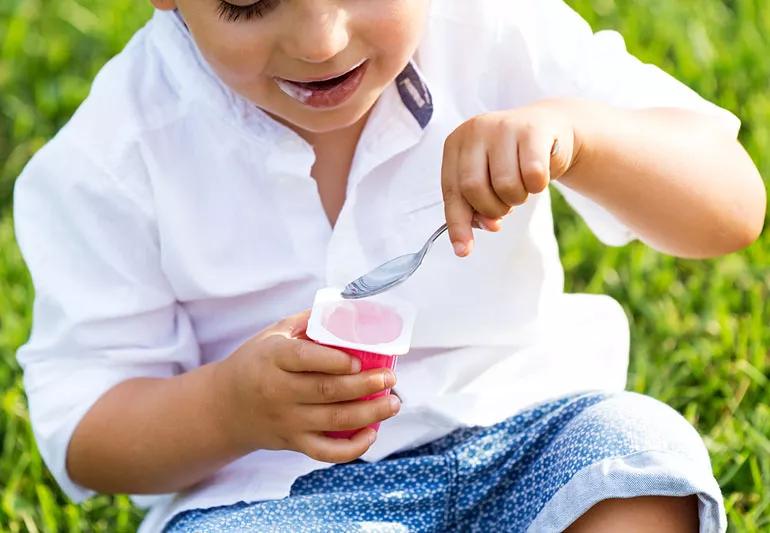How to help your child build healthy bones

Image content: This image is available to view online.
View image online (https://assets.clevelandclinic.org/transform/661e5d8e-d527-499e-985a-d7c199dfae85/childEatYogurt-1143316183-770x533-1_jpg)
child sitting in grass eating yogurt
“But I don’t want milk! Do I really have to drink it?”
Advertisement
Cleveland Clinic is a non-profit academic medical center. Advertising on our site helps support our mission. We do not endorse non-Cleveland Clinic products or services. Policy
Coercing kids to consume calcium is a daily struggle for some parents. We all know milk is good for bones, but isn’t there another option? What about kids who don’t like milk or can’t have dairy due to lactose intolerance?
Pediatrician David Shafran, MD, understands. Here are the top five things he wants parents to know about milk, calcium and helping kids build strong bones.
There’s no way around it. “Calcium is extremely important for bone growth, especially when kids are growing fastest, between ages 9 and 18,” Dr. Shafran says. “In their 20s, they will achieve peak bone mass. The stronger their bones then, the less risk of developing osteoporosis later.”
According to the National Institutes of Health, here’s how much calcium children need each day:
Calcium is a must for adults as well (1,000–1,200 mg/day), but only to replenish bone that naturally breaks down throughout life. After puberty, you can only maintain bone strength — you can’t increase it, no matter how much calcium you get.
“Milk, yogurt, cheese and other dairy products are the best and easiest ways to consume calcium,” Dr. Shafran says. One cup (8 oz.) of milk has about 300 mg of calcium. So, three cups of milk per day can put tweens and teens close to their recommended daily intake.
Advertisement
“Even chocolate milk counts,” says Dr. Shafran. “Ice cream counts, too.”
Lactose-free milks, including soy milk and rice milk, are good sources of calcium for kids who are lactose intolerant. Some green, leafy vegetables also contain calcium, as does calcium-fortified orange juice – which is almost as bone-building as milk.
Compare the calcium in these foods:
“It’s very rare that I recommend giving a child calcium supplements,” Dr. Shafran explains. “Because so many foods are fortified with calcium, it’s hard not to eat it.”
The same is true for vitamin D, which helps the body absorb calcium. While many adults take vitamin D supplements, kids usually get enough through vitamin-fortified foods — or by getting 5 to 10 minutes of sunshine each day.
Kids under one year should get about 400 IU of vitamin D a day. After age 1, that recommendation is bumped up to 600 IU.
“Exposure to sunlight for 5 to 10 minutes two or three times per week — optimally between the hours of 10 a.m. and 3 p.m. — gets you 3,000 IU of vitamin D,” Dr. Shafran adds.
Diet isn’t the only factor in bone growth and development. Dr. Shafran notes that physical activity — particularly exercise that puts stress on your muscles and bones — is equally important. Weight-bearing exercises include:
According to the National Institutes of Health, children and teens should get at least 60 minutes of physical activity each day and do weight-bearing exercise at least three days per week.
So, if your kids have a bone to pick with milk, don’t worry. They still can get calcium from other sources and strengthen their bones with weight-bearing exercise.
Helping your child or teen learn bone-healthy habits now can build them up for a strong future.
Advertisement

Sign up for our Health Essentials emails for expert guidance on nutrition, fitness, sleep, skin care and more.
Learn more about our editorial process.
Advertisement
Most kids get enough protein in a regular diet — too much can have side effects
Look for snacks that are low in sugar and high in fiber, protein and healthy fats
Turn down the pressure, but don't stop offering
Kids typically get all the nutrients they need from food, but supplements can add peace of mind
The five major food groups offer different types of nutrients in the right proportions
Be a good role model, set family meal times and involve your kids in meal planning
How to keep kids' diets healthy while the sun heats things up
Fiber can lower blood pressure and promote healthy bowel function
Prioritize your health by managing stress, strengthening your social connections and getting quality sleep
Bolsters, blankets, pillows and blocks can offer extra support, stability and comfort
Allergies, postnasal drip, asthma or reflux could be to blame for a cough that won’t quit